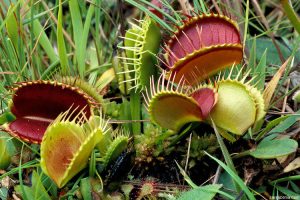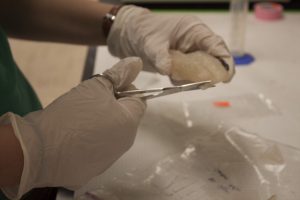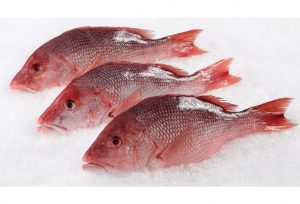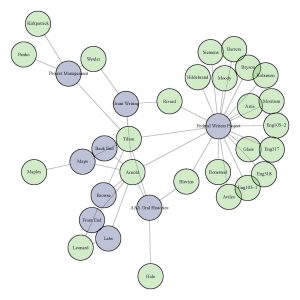Publications
Peer-reviewed publications related to the UNC-Chapel Hill Quality Enhancement Plan (QEP) and QEP courses. Check back for more as we continue to progress through our QEP implementation and assessment.
Engelke, A., Hutson, B, Hogan, K.A., Mizzy, D, Plenge, M, Coble, J, McCombs, M., Williams, J. (2020). Faculty Collaborations to Put Maker Competencies into Course Assignments
Book chapter in Maker Literacies for Academic Libraries: Integration into Curriculum. ALA Editions. Edited by Keery, P.M. Chicago.
Making at the Research University
Hutson, B., Mizzy, D., Goldberg, R. & Walters, G. (2020, November 19).
QEP CURE Poster Presentation
Hogan KA, Bruno JF, Steinwand BJ, Sathy V, Robertson SC, Nasiri M, Strauss CL, Hutson BL. Do faculty in a college-wide CURE program achieve the design goals they planned via a year-long faculty learning community? Society for the Advancement of Biology Education Research (SABER) National Meeting, Minneapolis, 2019.
How We Teach Now
Sathy V, Nasiri M, Strauss CL, Hutson BL. (2020). The CURE for Broadening Participation in Undergraduate Research. In T. M. Ober, E. Che, J. E. Brodsky, C. Raffaele, & P. J. Brooks (Eds.).How We Teach Now: The GSTA Guide to Transformative Teaching (pp. 417-429). Retrieved from the Society for the Teaching of Psychology
Inclusive Research Experiences
Sathy V, Strauss CL, Nasiri M, Panter AT, Hogan KA, Hutson BL. (2020). Cultivating Inclusive Research Experiences through Course-based Curriculum. Scholarship of Teaching and Learning in Psychology. Advance online publication. https://doi.org/10.1037/stl0000215
BIOL 221L The Evolution of Extraordinary Adaptations

A publication from students who made discoveries in this CURE class with Dr. Chris Martin.
![]() Testing Darwin’s Hypothesis about the Wonderful Venus Flytrap: Marginal Spikes Form a “Horrid Prison” for Moderate-Sized Insect Prey
Testing Darwin’s Hypothesis about the Wonderful Venus Flytrap: Marginal Spikes Form a “Horrid Prison” for Moderate-Sized Insect Prey
Davis AL, Babb MH, Lowe MC, Yeh AT, Lee BT, Martin CH. 2019. Testing Darwin’s Hypothesis about the Wonderful Venus Flytrap: Marginal Spikes Form a “Horrid Prison” for Moderate-Sized Insect Prey. American Naturalist 193(2):310-317.
BIOL 221L Food Mislabeling Lab: Seafood Forensic
 A publication describing the value of failing in CUREs, published by Dr. John Bruno, Dr. Blaire Steinwand and collaborators.
A publication describing the value of failing in CUREs, published by Dr. John Bruno, Dr. Blaire Steinwand and collaborators.
![]() Students Who Fail to Achieve Predefined Research Goals May Still Experience Many Positive Outcomes as a Result of CURE Participation
Students Who Fail to Achieve Predefined Research Goals May Still Experience Many Positive Outcomes as a Result of CURE Participation
Gin LE, Rowland AA, Steinwand B, Bruno J, Corwin LA. 2018. Students Who Fail to Achieve Predefined Research Goals May Still Experience Many Positive Outcomes as a Result of CURE Participation. CBE-Life Sciences Education 17(4), ar57.
BIOL 221L Seafood Forensics Shrimp Sample
A study conducted by students in Biol 221L Seafood Forensics that found 34% of the shrimp they sampled in NC was mislabeled, and roughly 1/3 labeled as “local” was actually imported from the eastern Pacific.
![]() Marketplace Shrimp Mislabeling in North Carolina
Marketplace Shrimp Mislabeling in North Carolina
Korzik ML, Austin HM, Cooper B, Japerse C, Tan G, Richards E, Spencer ET, Steinwand B, Fodrie J, Bruno JF. 2019..
BIOL 221L Red Snapper Mislabeling
 A study conducted by students in Biol 221L Seafood Forensics that found a high proportion of red snapper sold in North Carolina is mislabeled.
A study conducted by students in Biol 221L Seafood Forensics that found a high proportion of red snapper sold in North Carolina is mislabeled.
![]() A High Proportion of Red Snapper Sold in North Carolina is Mislabeled
A High Proportion of Red Snapper Sold in North Carolina is Mislabeled
Spencer ET, Richards E, Steinwand BJ, Clemons J, Dahringer J, Desai P, Fisher M, Fussell S, Gorman O, Jones D, Le A, Long K, McMahan C, Moscarito C, Pelay C, Price E, Smith A, VanSant A, Bruno JF. 2020.
CHEM 262L CURE in an Undergraduate Organic Chemistry Laboratory
![]() Development of a Large-Enrollment Course-Based Research Experience in an Undergraduate Organic Chemistry Laboratory: Structure-Function, Relationships in Pyrylium Photoredox Catalysts
Development of a Large-Enrollment Course-Based Research Experience in an Undergraduate Organic Chemistry Laboratory: Structure-Function, Relationships in Pyrylium Photoredox Catalysts
Cruz, CL, Homberg-Douglas N, Onuska NPR, McManus JB, MacKenzie, Hutson, BL, Eskew NA, Nicewicz DA. J Chem Educ 2020, 97, 6, 1572-1578.
ENGL 353 Rhetoric and Digital Humanities: Becoming Digital Makers
A publication that argues for a pedagogical approach that teaches students digital literacy through archival rhetorics by converting archival texts into data, published by Dr. Courtney Rivard.
![]() Turning Archives into Data: Archival Rhetorics and Digital Literacy in the Composition Classroom
Turning Archives into Data: Archival Rhetorics and Digital Literacy in the Composition Classroom
Rivard, C. 2019.Turning Archives into Data: Archival Rhetorics and Digital Literacy in the Composition Classroom. College Composition and Communication 70(4):527-559.
ENGL 353 Rhetoric and Digital Humanities: Becoming Digital Makers
 This publication discuss how building pedagogy in a project serves a a tool for teaching undergraduate students key methods in digital humanities, published by Dr. Courtney Rivard and colleagues from the University of Richmond.
This publication discuss how building pedagogy in a project serves a a tool for teaching undergraduate students key methods in digital humanities, published by Dr. Courtney Rivard and colleagues from the University of Richmond.
![]() Building Pedagogy into Project Development: Making Data Construction Visible in Digital Projects
Building Pedagogy into Project Development: Making Data Construction Visible in Digital Projects
Rivard C, Arnold T. Tilton L. 2019.Building Pedagogy into Project Development: Making Data Construction Visible in Digital Projects. Digital Humanities Quarterly. 13(2).
INST 195 Brine Shrimp as a model for Plankton Movement
Students in Dr. Laura Miller’s IDST 195 Undergraduate Research Consulting Team (URCT) participated in the research contributing to this publication.
![]() Experiments and Agents Based Models of Zooplankton Movement within Complex Flow Environments
Experiments and Agents Based Models of Zooplankton Movement within Complex Flow Environments
Ozalp MK, Miller LA, Dombroski T, Braye M*, Dix T*, Pongracz L*, Howell R.*, Klotsa D, Pasour V, Strickland WC. Experiments and Agent Based Models of Zooplankton Movement within Complex Flow Environments. Submitted to Biomimetics
